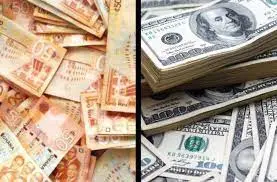The Rapidly Deprecating Cedi: Will the Anchor hold in the Storms of Ghanaian Economic Life?
The tremendous and continuous fall of the cedi against the dollar, is a compelling evidence for measures to address the devastating impact on the incredibly fragile economy to save Ghanaians from further suffering. Unfortunately, very little or nothing appears to be going on to address this devastating situation by government.
The disappointing depreciation of the cedi against the dollar in March 2022, gave the strong indication that the cedi was the worst performing currency in Africa and this was subsequently comfirmed by Bloomberg.
The notorious and rapid depreciation of cedi against the major trading currencies, especially the US dollar, gives cause for alarm, especially when the members of GUTA for the first time, in our multi party democracy, have threatened to close their shops in protest against their dwindling capital and high cost of doing business due to the depreciation of the cedi and profoundly high inflation. Though the government has pleaded with GUTA to rescind its decision, there are no clear cut remedial measures from the government to address the free and frustrating fall of the cedi that could engender confidence among the apprehensive Ghanaian populace.
The notoriously weak cedi, leaves Ghanaians unbelievably exposed to very high food prices which has profoundly eroded the real incomes and the purchasing power of most employees in the country.
Apart from the devastating blow of rising food products, Ghanaians are now exposed to threat on their health delivery system, as many local pharmaceutical companies find it very difficult to get the dollar to import raw materials for the production of drugs which are mostly patronized by over the counter dealers. The implication of this situation is that, over the counter drugs will become astronomically expensive and will run out with time.
This circumstance will make the Ghanaian health delivery system very vulnerable thereby eroding the gains made over the years in the health delivery sector.
Looking at the structure of our economy, the Ghanaian cedi, is likely to witness further depreciation since Ghana is a net importer of crude oil, and also imports over 60% of its iron ore for the manufacturing sector.
From all indications, COVID-19 pandemic was somehow a blessing to Ghana, since imports slowed down significantly during the period leading to a more stable currency. As the economy slowly opens up, the cedi hit the rock as imports rebounded. The already high debt ratios coupled with the inability of the government to access funds from the international money markets has limited its ability to handle the situation.
Analyst who argued about the February to March 2022, season which Ghanaian based multinationals repatriated their profits have thrown in the towel as Moody’s, Fitch, Standard and Poor have further downgraded Ghana.
The decision of the government to go to the IMF seems to be the only glimmer of hope and window of opportunity for the fast depreciating cedi. Doubts however still abound, as government has failed to conclude with certainty and clarity, a deal with the IMF, especially when Argentina has been trying to seek help from IMF for some years now without success.
Ghanaians should brace themselves for tougher huddles and more frustrating hardship as a result of worsening plight of the cedi, high debt profile, depleting foreign reserves and rapidly increasing global food and oil prices.
By Kafui Agbleze
Col. Agbleze’s Residence
Lagoon view
P. B. Box 28
Dornorgbor
Anloga

